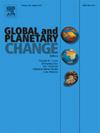东南亚雨林在冰河时期向巽他大陆架扩展的过程中丧失了生物多样性
IF 4
1区 地球科学
Q1 GEOGRAPHY, PHYSICAL
引用次数: 0
摘要
热带森林从广泛的土地使用中恢复的能力仍然是一个争论不休的问题,尽管它对指导保护和恢复政策非常重要。东南亚的情况尤其如此。幸运的是,巽他陆架在末次冰期海平面最低潮期间大面积裸露,为研究热带森林在新的容纳空间中长期和景观尺度的发展提供了一个独特的窗口。在此,我们对南中国海南部的三个沉积岩芯进行了花粉分析,其中两个位于巽他陆架古河口前方,另一个靠近婆罗洲北部,目的是评估东南亚 "原始 "和 "次生 "热带森林之间的相似性/差异性。研究发现,这些地点的主要花粉类群和已确定植物类型的生命形式组成非常相似,这表明,尽管巽他陆架的土壤是沙质的,而且可能是盐碱的、缺乏营养的,但结构良好的热带雨林应该已经扩展到巽他陆架。然而,从花粉丰富度推断,巽他陆架的植物生物多样性明显低于婆罗洲。这表明生物多样性在大规模分布区扩张过程中有所丧失。我们的研究结果表明,东南亚低地具有重新造林的潜力,但遗憾的是,仅靠自然再生无法将生物多样性恢复到受干扰前的水平。此外,婆罗洲北部山区的古老森林似乎是不可替代的,因此是保护工作的重点。本文章由计算机程序翻译,如有差异,请以英文原文为准。
Southeast Asian rainforest lost biodiversity during the range expansion to ice-age Sunda Shelf
The capability of tropical forest to recover from extensive land-use remains a matter of debate, despite its importance for guiding conservation and restoration policies. This is especially the case for Southeast Asia. Fortunately, the Sunda Shelf was extensively exposed during the Last Glacial Maximum sea-level lowstand, providing a unique window to study the long-term and landscape-scale development of tropical forest in new accommodation spaces that may be analogous to those emerge after the cessation of human activities. Here we conduct pollen analyses on three sediment cores from the southern South China Sea – two located in front of the Sunda Shelf paleo-river mouths and one close to the northern Borneo – in order to evaluate the similarity/difference between the “primary” and “secondary” tropical forest of Southeast Asia. The assemblages of major pollen taxa and the life-form composition of identified plant types are found to be quite similar among the sites, indicating that well-structured rainforest should have expanded to the Sunda Shelf despite the sandy and potentially saline, nutrient-poor soils. The plant biodiversity, however, was obviously lower on the Sunda Shelf than on Borneo as inferred from the pollen richness. This indicates a loss of biodiversity during large-scale range expansions. Our findings suggest the potential of reforestation in the lowlands of Southeast Asia, but unfortunately the incapability of restoring biodiversity to pre-disturbance levels through natural regeneration alone. Moreover, the old forests in the mountainous northern Borneo appears to be irreplaceable and thus a priority of conservation efforts.
求助全文
通过发布文献求助,成功后即可免费获取论文全文。
去求助
来源期刊

Global and Planetary Change
地学天文-地球科学综合
CiteScore
7.40
自引率
10.30%
发文量
226
审稿时长
63 days
期刊介绍:
The objective of the journal Global and Planetary Change is to provide a multi-disciplinary overview of the processes taking place in the Earth System and involved in planetary change over time. The journal focuses on records of the past and current state of the earth system, and future scenarios , and their link to global environmental change. Regional or process-oriented studies are welcome if they discuss global implications. Topics include, but are not limited to, changes in the dynamics and composition of the atmosphere, oceans and cryosphere, as well as climate change, sea level variation, observations/modelling of Earth processes from deep to (near-)surface and their coupling, global ecology, biogeography and the resilience/thresholds in ecosystems.
Key criteria for the consideration of manuscripts are (a) the relevance for the global scientific community and/or (b) the wider implications for global scale problems, preferably combined with (c) having a significance beyond a single discipline. A clear focus on key processes associated with planetary scale change is strongly encouraged.
Manuscripts can be submitted as either research contributions or as a review article. Every effort should be made towards the presentation of research outcomes in an understandable way for a broad readership.
 求助内容:
求助内容: 应助结果提醒方式:
应助结果提醒方式:


